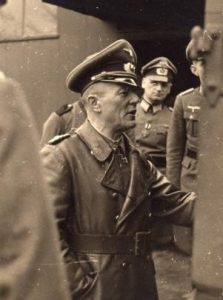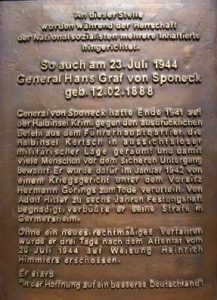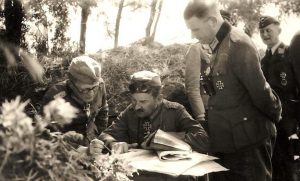
I’m currently working on a book on the German Wehrmacht’s involvement in the early phases of the Holocaust in the southern Ukraine in 1941, focusing on front-line infantry units under the command of General Hans von Sponeck. This builds upon and expands the findings of an article that I published in the German military history journal Militärgeschichtliche Zeitschrift in 2013. This article uncovered the involvement of General von Sponeck—previously thought to have been part of the military resistance to Hitler—in war crimes and crimes against humanity during the invasion of the Soviet Union. These revelations caused a sensation in Germany when it was reported in the newsweekly DER SPIEGEL that findings similar to those of my article had been reported internally to the German Ministry of Defense by a Bundeswehr (Federal Armed Forces) historian back in 2005 but were swept under the rug and never disclosed publicly. This sparked a debate in German parliament in 2014 about the fact that an air force base in Germersheim bore Sponeck’s name and that monuments commemorating his heroism but ignorant of this other side of his past were in public view. This led in 2015 to the formal renaming of that base and alterations to monuments erected in his honor.

The book will cover the full arc of General von Sponeck’s career and the reception, impact, and implications of my findings about him. The book’s ground-level narrative on the crimes committed by Sponeck’s infantry unit in Bessarabia and the southern Ukraine in 1941 (and the contentious issues these findings raised in Germany) will illuminate an aspect of the Holocaust largely absent in the recent Anglophone literature on the Shoah, German war guilt, and redemption.[1] There is, indeed, little if any public awareness in the US or Germany of the extent that ordinary Wehrmacht soldiers in front-line units were active agents in the Holocaust, how they evaded postwar justice, or how American and British postwar leaders were complicit in that process as West Germany rearmed and was integrated into NATO in the 1950s.
Likewise absent is much grasp of the fact that denial and evasion continue to shape the official response to this aspect of the Nazi past in contemporary Germany, a picture at odds with the image the country seeks to project internationally of having learned from and mastered its past. Of the roughly thirty-five military installations bearing the names of former Wehrmacht personnel or ex-Nazis, to date only six have been renamed. Some of these installations honor men who had careers in both the Wehrmacht and Bundeswehr, but a larger number also honor such prominent military figures as Erwin Rommel, notorious despite his ultimate fate as a favorite of Hitler and a wartime Nazi propaganda creature of Joseph Goebbels. Others honor key members of the July 1944 plot against Hitler—Rudolf-Christoph von Gersdorff, Claus von Stauffenberg, and Henning von Tresckow—who served on the Eastern Front in lines of command where war crimes and crimes against humanity are well documented. The book will thus illuminate a deeper problem: the way West German military tradition embraced the myth of supposedly “exemplary” Wehrmacht figures thought to have remained “honorable” despite the unprecedented crimes of the Nazi regime.[2]We know today that such distinctions are problematic, and indeed, more often than not impossible given the overwhelming evidence emerging from historical research over the last thirty years of the Wehrmacht’s deep complicity in genocide and other crimes. As my book will seek to show, this complicity extended to officers like von Sponeck who themselves later became victims of the Nazi regime following Stauffenberg’s attempt on Hitler’s life on July 20, 1944 and who subsequently entered the Bundeswehr’s pantheon of the “honorable”.

A final important dimension of the book will seek to explain the continued hold of powerful taboos about the Wehrmacht in contemporary Germany. The German military’s documented suppression of historical evidence contrary to its postwar myths and the slow pace and reactive nature of the German government’s response to that evidence reflect the difficulty of confronting culpability that goes well beyond typical SS perpetrators. While there are vocal German critics of the Wehrmacht legacy in the Bundeswehr, most Germans remain invested in the myth that the bulk of ordinary soldiers remained honorable despite serving a criminal regime. I argue that this is because many Germans have relatives who served on the eastern front. Confronting that such men might have routinely mistreated or killed Jews, Red Army POWs, and Soviet civilians remains deeply taboo. Indeed, the implication that potentially millions of ordinary Wehrmacht troops had a hand in this “War of Annihilation” in the Soviet Union has faced recurring denial and backlash, as during the series of exhibits since the mid-1990s on the crimes of the Wehrmacht led by the historian Hannes Heer. Heer has since written about the troubling “disappearance” of these perpetrators in contemporary Germany.[3] The continued official commemoration of “honorable” Wehrmacht officers facilitates this invisibility, as does the official remembrance of the Holocaust focusing on SS criminality, underscored by the recent prosecutions of very low-level SS camp personnel. This distracts from what the journalist Ralph Giordano refers to as Germany’s “second guilt”: that tens of thousands of mid-level Nazi perpetrators escaped justice in postwar West Germany due to a deliberate campaign of judicial obstruction.[4] The vast majority of eastern front veterans escaped any sort of reckoning. My book is an attempt to make this visible and promote a critical reckoning with the legacy of the Wehrmacht in contemporary Germany’s armed forces.
[1] For example, Jeffrey Herff, Divided Memory: The Nazi Past in the Two Germanys (Cambridge, MA, and London: Harvard University Press, 1997); Jennifer Lind, Sorry States: Apologies in International Politics (Ithaca: Cornell University Press, 2008); Timothy Snyder, Bloodlands: Europe Between Hitler and Stalin (New York: Basic Books, 2010); Caroline Sharples, Postwar Germany and the Holocaust (London and New York: Bloomsbury, 2016).
[2] For an overview of this ongoing debate, see Eberhard Birk, Winfried Heinemann, and Sven Lange, eds., Tradition für die Bundeswehr: Neue Aspekte einer alten Debatte (Berlin: Miles Verlag, 2012).
[3] See Hannes Heer, Vom Verschwinden der Täter: Der Vernichtungskrieg fand statt, aber keiner war dabei (Berlin: Aufbau, 2005).
[4] Ralph Giordano, Die zweite Schuld, oder von der Last Deutscher zu sein, 2nd ed. (Cologne: Kiepenheuer & Witsch, 2008).

